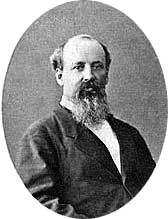Virginia rejects secession referendum; Lincoln pressures Fox
- In long-running Virginia State Convention considering secession, the delegates meeting in Richmond vote 89-45 against holding a statewide referendum on secession from the Union./1861
- Meanwhile in Washington, President Lincoln meets at the White House with Virginia unionist John B. Baldwin, a member of the Virginia convention considering secession. Secretary of State Seward had arranged the meeting some time ago when most sane people had hoped Lincoln would evacuate Fort Sumter for the sake of peace in exchange for assurances that the Richmond convention would adjourn, keeping Virginia in the Union. But by the time of today’s meeting, Lincoln had ordered expeditions for both Forts Sumter and Pickens. The President explains to Baldwin that the crisis has escalated, but that the Virginia convention still needed to adjourn. In light of developments, Baldwin rejects the President’s request, instead demanding the Federal government withdraw from both forts. Lincoln then abruptly ends the meeting.
- Later, Lincoln calls for Navy Captain Gustavus Fox, mastermind of the Fox Plan, and informs him that he will indeed “let the expedition go,” but Fox is worried whether it can make it to Charleston in time to save Major Anderson. The President, pushing his agenda, tells Fox it is his duty to his country to attempt the mission. Then Lincoln responds to an April 1 communique from Major Robert Anderson at Fort Sumter in which Anderson says he has about a week of rations left. Still under the impression that he will be evacuated shortly, Anderson has not put his garrison on short rations. Lincoln informs him of the upcoming relief of Fort Sumter, saying “the expedition will go forward” and should be expected “the 11th or 12th, a full week after his rations are scheduled to be depleted.” Lincoln orders Anderson to maintain the status quo if possible, but Lincoln gives him freedom to decide how to respond in the event of an attack by Confederate forces./1861
- Raphael Semmes, lately resigned from the U.S. Navy, returns from buying munitions in the North and begins his work in the Confederate lighthouse service/1861

 Image via Wikipedia
Image via Wikipedia
No comments:
Post a Comment